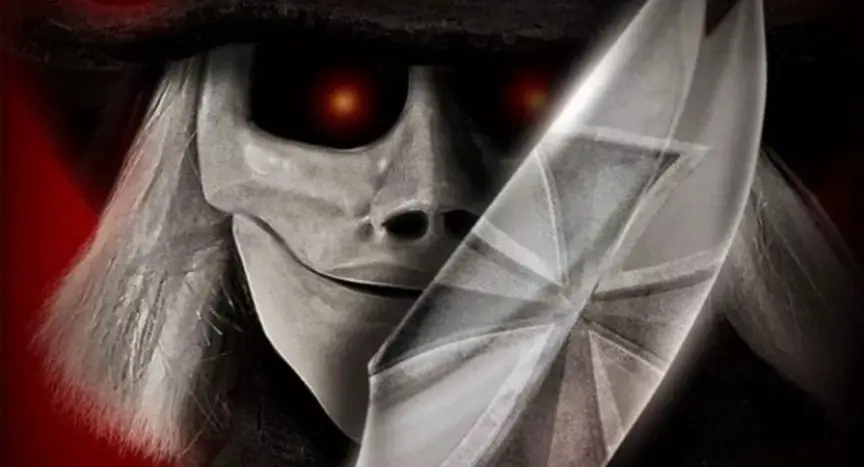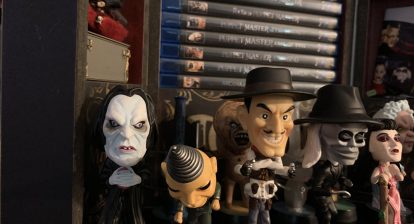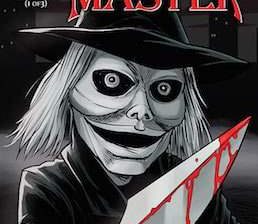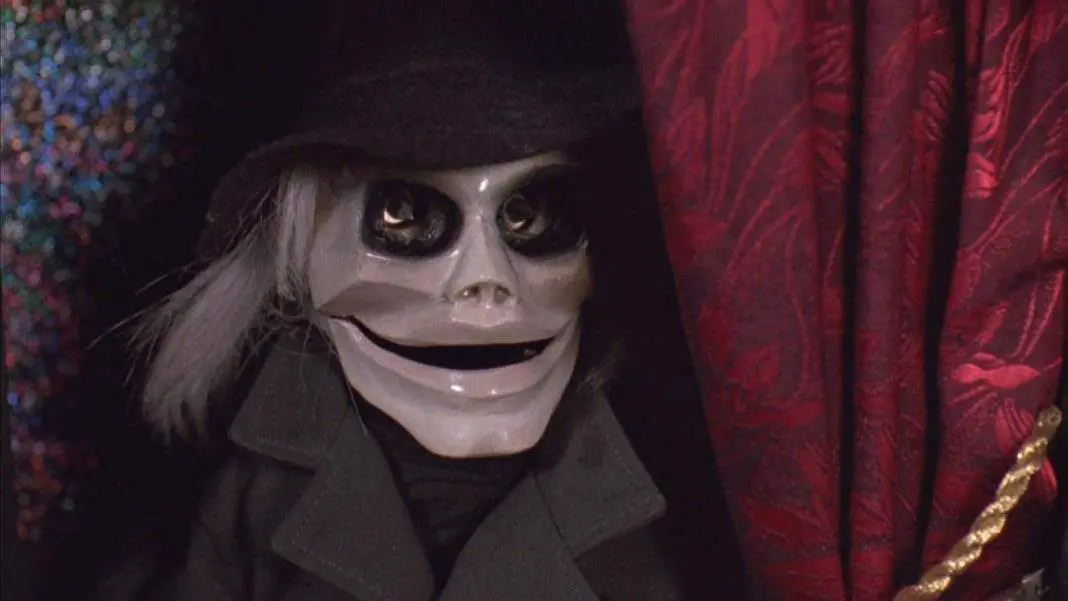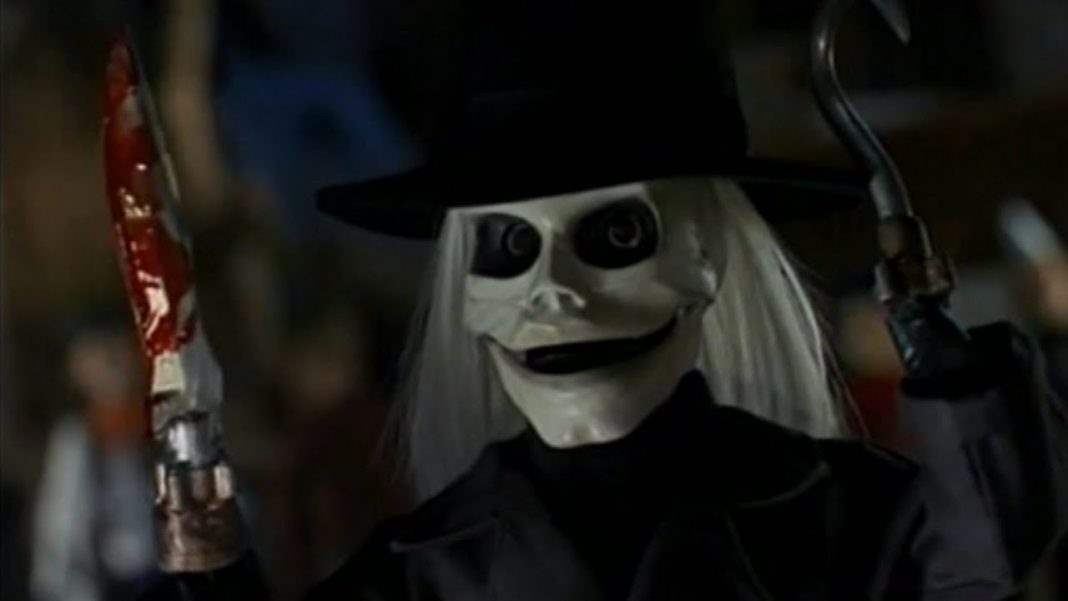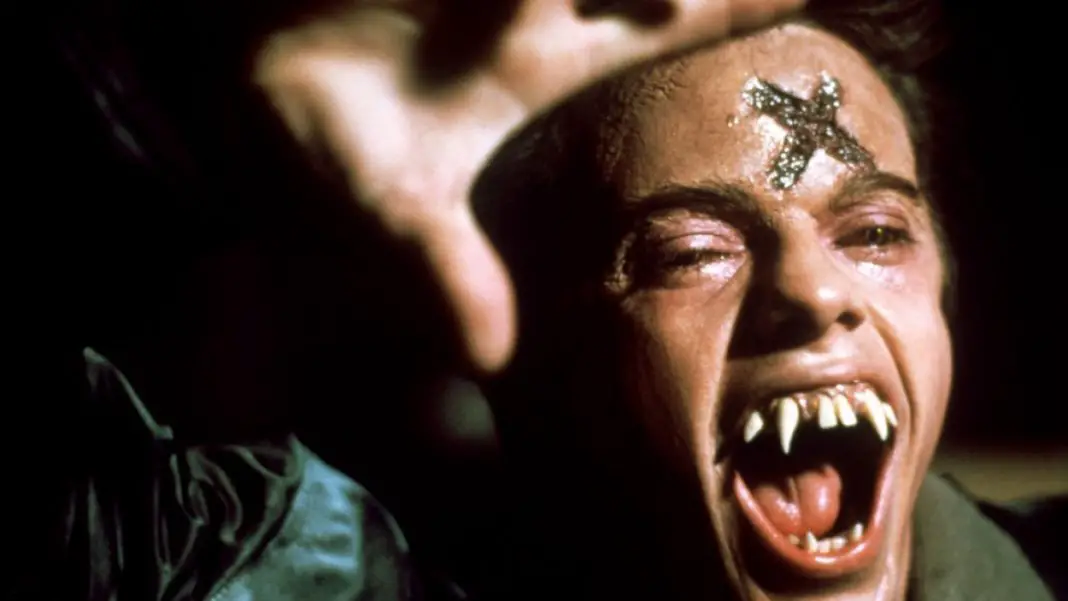The first great thing I can say about Blade: The Iron Cross, right out of the gate, is that I cannot believe it was shot in five days. I know that it was, because I even watched it happen. That is, after all, the central gimmick of Charles Band’s Deadly Ten: ten Full Moon movies produced right before your eyes, the whole production live-streamed, along with all sorts of extra bonus content. And of course I know that there were a lot of added photography to get the puppet FX right, something I very much appreciate as a fan. The result is something I’ll honestly say I was not expecting: a movie that doesn’t feel like it was made for a cent less than the high profile reboot that went to theaters, a movie that takes care of the continuity and understands it in a way I wasn’t sure I’d ever see from this franchise outside of a comic book again, a movie that is more sleek and technically well crafted than any Full Moon film I’ve seen in two decades, and above all a movie that represents a huge step forward for the Puppet Master franchise overall.
The story follows the previous film’s—for the continuity conscious, that’s Axis Termination—heroine Elisa Ivanov. Thankfully, much like Scarlet Witch in the Avengers movies, Elisa has lost her distracting accent from the previous movie. Tania Fox gets to play a much more fleshed out and endearing version of the character, almost a reimagining, The psychic elements are still there and right at the forefront but are coupled with her new job as a reporter, which gives her a snappier, Lois Lane edge that not only works perfectly for the period but just in general makes the character much more interesting. Partnered along with her and really adding to the ‘40s energy is Detective Joe Gray, played by Vincent Cusimano, who is surprisingly quick to believe Elisa’s visions. Together, they team up to tackle a Nazi plot for—naturally—world domination, while also of course being aided by Elisa’s puppet pal, Blade.
As for Blade himself, he is well represented in just about every way. I have been saying for years, as a fan of the series, that spinoffs would be a smart move because they’d not only allow for different kinds of storytelling in a series that has gone on this long, but they would also cater to the budgetary realities of the franchise and Full Moon. Some of the more recent Puppet Master entries had the puppets put together in about a week’s time, and we’re talking multiples of every puppet. That stretches an FX team incredibly thin and doesn’t allow for puppets that look as good as everyone wants, which is a big deal when talking about the stars of the film. I’m happy to say that I feel extremely validated, in that regard, by the way this movie turned out. Blade: The Iron Cross looks like it hails from a bygone era of Puppet Master because care is clearly taken with the central puppet. Granted, he’s not on screen as much as you’d think and I’m still not a huge fan of his new Bruce Campbell chin, but when he is on screen, he has plenty to do. There’s an animatronic puppet that you can tell Tom Devlin and his FX crew put a lot of work into and it goes a long way toward making this feel like the early days of the series. Which is amazing, when I’ve long since trained myself to get excited over a puppet standing still on camera and just slightly moving its arm. There is, I’ll admit, a bit of green screen suit acting for Blade as well, but it’s edited well and looks much more convincing than its infamous usage in Axis Termination. I’m also still in disbelief that the movie could show me anything with Blade that I had not seen before, let alone something I couldn’t believe hadn’t been done before now, but it does. There’s a bit with Blade’s eye spikes that feels amazing just in that it had somehow never happened before.

Even better, though, as a fan, is how the film treats Blade as a character. I went in a little nervous because I didn’t really know how the central icon would be treated, given that this is his first solo movie and all. I shouldn’t have worried at all. You can even almost feel an influence of the recent comics, because there’s so much care taken to make it clear that Blade is a character and not just a prop or a cool effect. Even though there’s not a lot of time spent on it, one of the best things about Blade: The Iron Cross is the way it justifies being a solo outing for this puppet in particular.
It ties things back to Puppet Master III, which gave us Blade’s origin story. Dr. Hess, who had been working under the Nazis to find a way to reanimate fallen soldiers, turned coat to help the puppet master Andre Toulon, was killed for it and became Blade. The Nazis in this film, led by the mad scientist Dr. Hauser (played by Roy Abramsohn of Escape from Tomorrow) are furthering the experiments with reanimation using Hess’s leftover notes and the vial of formula he had taken from Toulon’s workshop. They are picking up where he left off. The mess at the heart of the film is one that Blade, when he had been a man, had no small part in making. This is a redemption story. There’s even a line in the movie that cements it as such. And I definitely think, simply from a story and a character perspective, that if we were going to have a solo Blade movie there needed to be a reason to justify why it centers on this character and not any of the other puppets, or why they couldn’t all be involved, and just in terms of these larger plot details, this does that without question.
As strange as it may sound, I also honestly love the way this entry approaches the Nazis. This is, after all, the fifth movie in the franchise in which Nazis make up the central villains, and it is the fifth to be set during World War II. In more recent entries, they have been cartoonishly over-the-top, which worked for those particular films, but even if there’s still a bit of that—particularly with Dr. Hauser—this is a refreshing change of pace. I don’t know if this was an intentionally timely move, but I love for the fact that this time the focus is largely on American Nazis. The last few movies all centered on Germans that had infiltrated Los Angeles as spies, but this time there’s a shift to focus on Americans who happen to ally with the Nazi party, infiltrating the police force and even higher positions as well. Given that it was shot last summer it couldn’t possibly be intentionally timely, but man does the timing happen to work out really well nonetheless.

Speaking of timing, there’s one other thing this movie does with not only the Nazis that really surprised me and provides the film with an interesting—and refreshing—perspective. There’s a scene I love fairly early on in which one of the Nazis basically walks out on the whole operation by pointing out that the tide is turning, things have happened in France that are starting to happen everywhere, and basically points out that the writing is on the wall and they all know it. It’s really smart considering the timeframe of the series. We’ve had so many prequels set in World War II now, that we’ve actually seen it through to the end of the war. In general, this is a fascinating point in time to set any Nazi story and I both can’t believe and am really excited that Blade: The Iron Cross of all things does it. The Nazis know that the war is over and they have lost. They’re scrambling and they’re scared. And as silly and low-budget as this is, there’s care taken to demonstrate that. As over-the-top as the Nazi villains have been in recent Puppet Master outings, Blade is a breath of fresh air in that it lets them be pathetic. They’re scared old racists and their time is up, and they’re lashing out with increasingly absurd and extravagant plans because they know that. There’s even a great bit when, after Blade closes in on our villains, one of the highest-ranking and most intimidating Nazis in the group turns and runs screaming, leaving everyone behind as he tries to escape.
That’s not to say that there isn’t anything over-the-top or cartoonish about Blade: The Iron Cross, either. To try and say that would be a lie, because there’s a whole section of the plot revolving around a literal death ray. But even that works in context because it feels like it’s ripped straight out of an old 1940s serial, which in a way this kind of is. It’s embracing how much these long-running low budget franchises have in common with that kind of storytelling. Puppet Master basically is a serial at this point and we all just wait with each entry to see how our little gang makes it out of one predicament and finds themselves in the next.
Honestly, though, the greatest strengths of Blade: The Iron Cross lie in its technical elements. I’ve been so used to a static camera in this franchise for so long that to see something else was almost jarring. Other entries, even ones that I like, often had an air about them that suggested that if something was in frame and in focus it wound up in the movie. Blade has a very energetic, kinetic camera. It is constantly moving and that is very nice to see after all this time. It’s also the most impressive thing because, again, I watched a live-stream of the entire principal photography and I know how much time they didn’t have. This is the most fluid camera work I’ve seen in a Full Moon movie since Castle Freak. And it’s not just the camera movement, either. Lighting plays a big role, too. There are a lot of period genre pastiches going on here, and they’re all lit very appropriately, from the snappy reporter stuff to the heavily shadowed noir elements and the seedy bad guy hideout. These areas are, I think, where John Lechago truly proves himself the man for the job.

I am not by any means saying that Blade: The Iron Cross is not extremely low budget and quickly made or that it never shows it, because there are times when it certainly does. Some of the supporting actors don’t quite hit the mark and there’s a little too much talk about bio-energy, I’ll admit. And I know that some people will look at this and see absolutely no difference between this and the recent Puppet Master movies that have come before it, but I do. This is the first modern Puppet Master movie I wish I could show my childhood self and I think that, right there, says everything. Not only because I’ve wanted a Blade movie since I was eight, but because of how much care was taken in delivering on that, especially within the realities of time and budget. My opinion is absolutely colored by being a fan, and the kind of fan who has spent the last two years writing a book on this very franchise on top of that, but I’m also a fan who learned how to manage my expectation with this series when I was still pretty young. I’ve gone in looking for any good I could gleam out of a new Puppet Master for a long time now, so it’s with both excitement and a huge sigh of relief that I am able to say that against all odds, even if it’s still on a minuscule budget, everything I love about the series is on display in this new entry, and the child in me who brought his Blade action figure everywhere he went is happy to see that this two-foot Klaus Kinski finally got the standalone movie he’s always deserved.
WICKED RATING: 7.5/10
Director: John Lechago
Writer: Roger Barron
Stars: Tania Fox, Roy Abramsohn, Vincent Cusimano
Release Date: June 26th, 2020
Studio/Production Company: Full Moon Features
Language: English
Run Time: Approx. 75 minutes
